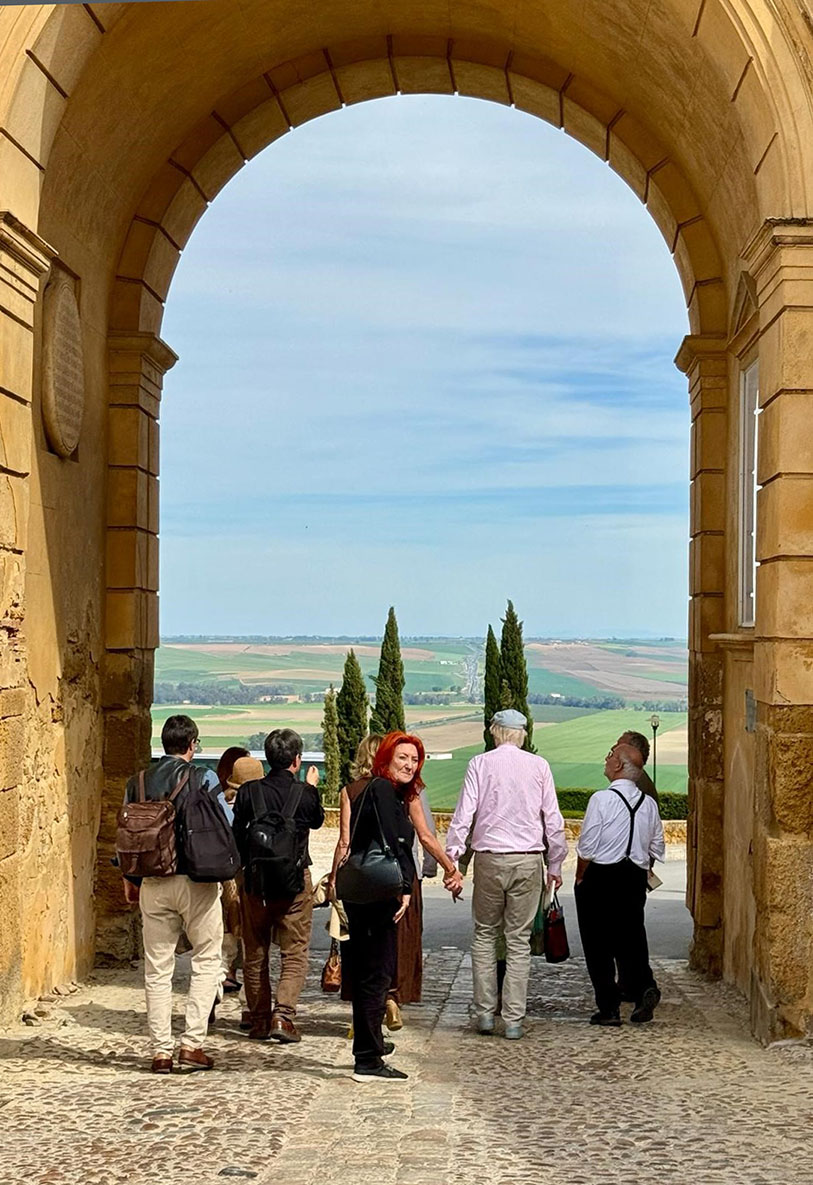Stephen Frears is going to make a film about Billy Wilder, Ha-Joon Chang confesses that One Hundred Years of Solitude is his favorite novel, and Carlos Franganillo, argues that we tend to idealize the past… All this at the Hay Festival Seville 2024.
The Hay Festival now has a presence in Seville, with an audience that listens attentively to the wise and ironic words of Stephen Frears, who lashes out left and right, including at himself. “I’ve always been parasitic. I keep leaning on other people’s stories to make my films,” he says. But an Irishman in the audience thanks him for how he has always treated Ireland. “Even if you say you didn’t know anything about Ireland, you can tell that you take advice, and look straight ahead and cleanly at the problems,” he remarks. “It’s the ear,” Frears replies, “You direct with your ear, it’s the ear that tells you that what you’ve filmed is believable.” The filmmaker doesn’t quite explain how his films, especially “Dangerous Liaisons”, were so successful in Catholic countries, such as Spain and Ireland. But nevertheless, they were.
“Fingers crossed, it looks like we already have the funding for our movie about the great Billy Wilder,” he adds. Maybe Wilder will pave the way for him to the Oscar, which he didn’t get, despite having been nominated for The Queen. Scorsese won that year, 2007, with The Departed a remake of a fantastic 2002 Chinese film “Internal Affairs”, (Wújiàndào, 無間道) which I saw in Hong Kong, co-directed by Andrew Lau and Alan Mak, and starring one of China’s biggest stars, Andy Lau. Truth be told, I found the original Chinese film much better than the 2006 American remake.
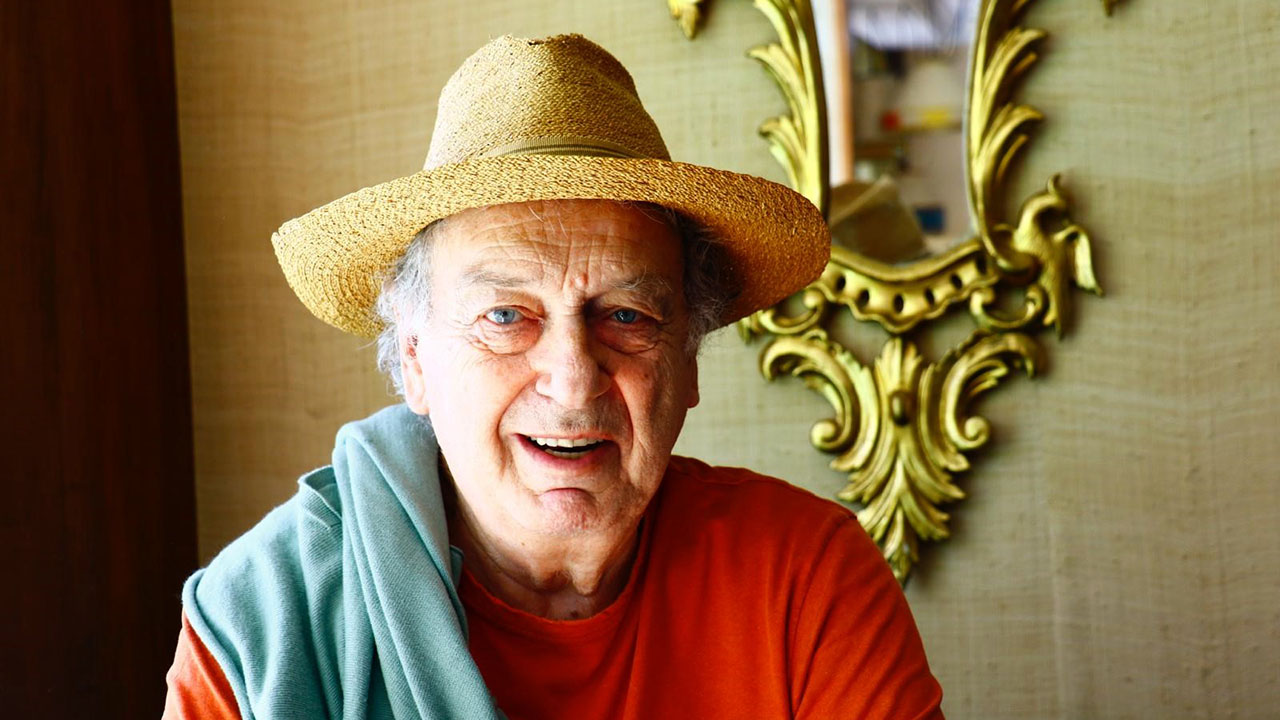
Stephen Frears – Hay Festival Sevilla 2024
In another of the events, Teodoro León Gross softens the title of his book The Death of Journalism and raises the conversation, saying that what has died is a certain journalism, or rather, a certain power that journalism had, when in fact it was the fourth estate.
Pepa Bueno drew an excellent map of the crisis of legitimacy in journalism, focusing on three factors. The internet committed the first sacrilege. It shot the pianist. It knocked dead three of the five questions that journalism answered. The what, the how, and the when, came out feet first. And the how, and the why, have already been well accounted for, bloggers, Youtubers, Tweeters, and anyone with a mobile phone. The rest was done by the confusion between communication and journalism due to the lack of economic resources and transparency in the financing of the media, as well as the loss of legitimacy of the media for having slept in limbo, when the financial crisis arrived, because people wondered how the fourth estate was unable to warn about subprime mortgages and other financial abuses, nor was it able, especially in the United States, to tell the truth about the non-existence of weapons of mass destruction in Iraq.
All of these factors have led to the bizarre phenomenon of 2016. Some 80% of the US media said not to vote for Trump, but the reality was that he won the election. That is the greatest proof of the loss of power of journalism,” said Leon Gross. Carlos Franganillo lucidly replied that we tend to idealize the past, as if there was once a golden age of journalism. And that wasn’t the case either. With humour, Rafael Latorre added that to be pessimistic just shows bad manners (quote by Rosa Belmonte).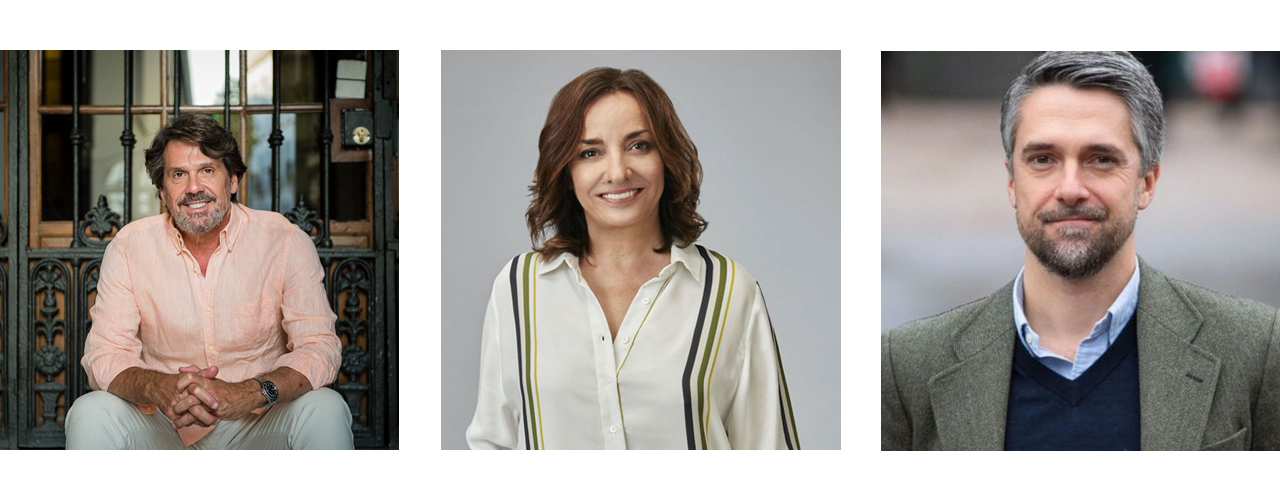 Teodoro León Gross – Pepa Bueno – Carlos Franganillo
Teodoro León Gross – Pepa Bueno – Carlos Franganillo
The prestigious economist, Ha-Joon Chang, aware that the intricacies of economic difficulties are at the base of what appear as demands for freedom or social welfare, worked hard in his talk to make the economy understandable to ordinary people, because we constantly make economic decisions –he insisted– in our day to day lives, without forgetting to say to his interviewer, Helena de Bertodano, who recently interviewed Sharon Stone, that his favorite novel is One Hundred Years of Solitude, as much about economics, as everything else, if one analyzes it –he continues– from the importance of the banana trade by the United Fruit Company at the time it was written.
The festival over, a splendid meal at the home of the chef, Gioconda Scott, who in addition to cooking, or better said, composing poetry with her cooking skills, put her house and garden at the disposal of the Hay for a poetry recital, which I had the privilege of coordinating. Among those reciting, apart from the great Stephen Frears and the Oscar-winning Sir Tim Rice, the wonderful poet Braulio Ortiz Poole, the outstanding and always supportive president of the Hay Festival, Caroline Michel, the splendid CEO of the Hay Festival, Julie Finch, the active and acerbic lawyer, Beltrán Gambier, the cosmopolitan Elizabeth Grüninger, The novelist and deputy director of La Vanguardia, Miquel Molina, and myself. By mistake, I left the journalist of La Nación, Laura Ventura, in the inkwell. Sorry for that. In live events, one is oblivious of the most obvious!!!
The culmination of the event was a magnificent gift from the José Manuel Lara Foundation, of the book Vandalia cien (2002-2021): almost 100 years of contemporary Hispanic poetry. It’s magnificent, among other things, because it’s a book that’s not for sale. It was delivered by Pablo Morillo Pérez, general director of the foundation.
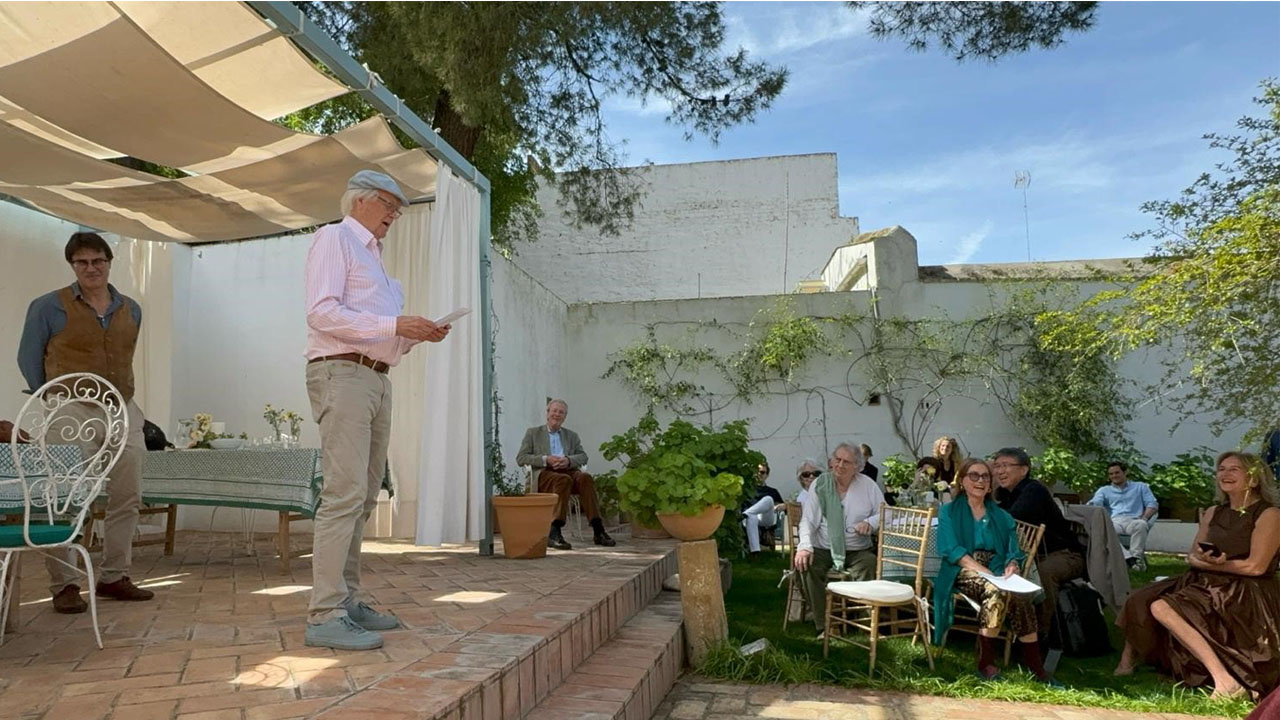 Sir Tim Rice
Sir Tim Rice
P.S.: The title of this post “He who stumbles and doesn’t fall, takes two steps” is a phrase I heard walking around Seville, with Sheila Chremaschi, director of the Hay Festival. I had never heard it, and I thought it was very descriptive of what we do every day, tripping over everything, about to fall!! Thank you, Sheila, as always for the opportunity to be at the Hay.
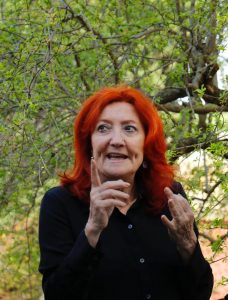
Sheila Cremaschi, director of the Hay Festival
In the aforementioned book there are beloved poets, such as Juan Vicente Piqueras, who wrote the prologue to my book “The Geography of the Hedgehog“, from which in the recital I mentioned the verse “Nothing more romantic than paying a bill”, dedicated to the financial director of the Hay, Amanda Cartwright; Luis Alberto de Cuenca, who has written the prologue to my recent book “Besos de otros mundos“, and Braulio Ortiz Poole himself. I would have liked to have been among them!! I should try harder!!
I’m leaving some poems here, and it’s a shame I couldn’t get Sir Tim Rice to recite one of his Oscar-winning songs. In any case, he read, for example, from the magnificent Roger McGough’s “The Leader“:
The Leader
I wanna be the leader
I wanna be the leader
Can I be the leader?
Can I? I can?
Promise? Promise?
Yippee I’m the leader
I’m the leader
OK what shall we do?
Excerpt from Black Paint: Braulio Ortiz Poole’s Duel with Cudgels:
II
Spain,
why is it hard to tell you?
Why do you sometimes seem
a relentless mother
who denies milk to his bastards?
A land of so much light,
why this determination to be so dark?
The Discord of the Geography of the Hedgehog, José Félix Valdivieso.
Dedicated to Hay’s Chief Financial Officer, Amanda Cartwright.
The sentences tumble:
Places make love;
I take a deep breath, so I don’t have to say goodbye to you;
There’s nothing more poetic than paying a bill;
There are sad enchanters of the world.
It’s all a contradiction.
How could it be otherwise,
the goddess Eris keeps the Discord alive.
Kisses from other worlds, José Félix Valdivieso
Kissing you was a mistake
Falling in love, no.
